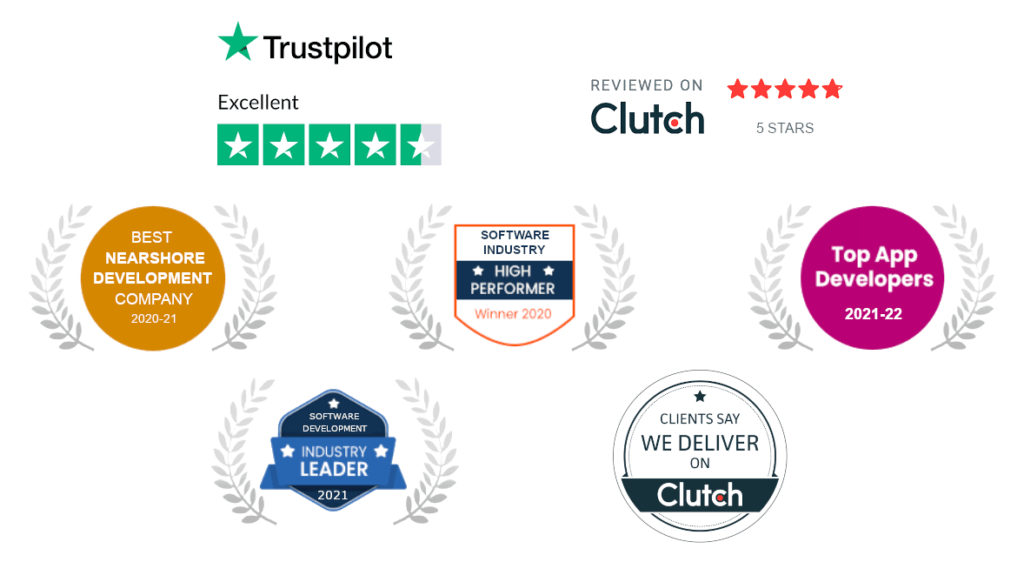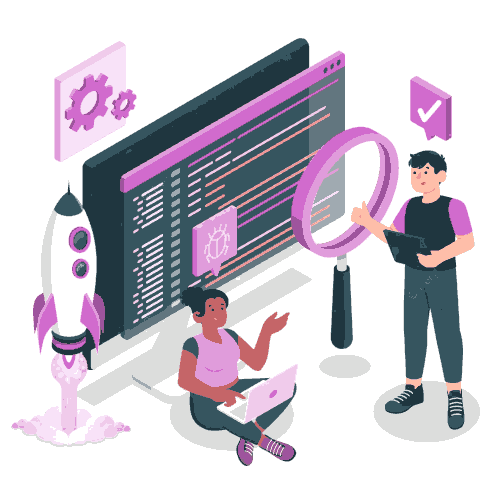We Help You Hire an Integration QA Engineer From South America

You can often find it difficult and time-consuming to find an ideal nearshore company to handle testing on your upcoming Integration project. It is important to find an Integration QA Engineer who is smart, responsible, hardworking, and has proven experience and skills.
To find the optimal development partner for your project, we use a custom AI matching algorithm. For an excellent team match, we combine data and personal interviews.
Hire a QA Integration Engineer who will contribute quality tests to your team from the start. Due to this, our hiring process has been refined over several years, and it’s trusted by many fast-growing startups. Add an expert to your team by hiring your future QA Integration Engineer from QATPro.
South American Pricing
Our team is made up of talented and experienced Integration QA Engineers from Brazil who are eager to work with US companies.
South American Rates
We have gathered together a great group of talented and experienced test Engineers from South America who are eager to work with US companies.
Save With One Low Cost Fee
Our company takes care of all employee benefits, local employment taxes, and other costs related to employment..
Verified Integration QAs Only
Choosing a Integration QA engineer from us guarantees you’re hiring a skilled professional who’s been tested.
Testimonials



What is Automation QA?

Automation QA (Quality Assurance) refers to the practice of using automated tools and scripts to perform software testing tasks. It involves creating and executing test cases, validating expected outcomes, and comparing them with actual results using specialized software or frameworks. Automation QA aims to streamline the testing process, improve efficiency, and increase test coverage. Here’s an introduction and two headings that provide further insights into automation QA.
Benefits of Automation QA
Automation QA offers several advantages over manual testing, making it a valuable approach in software development and quality assurance.
Improved Efficiency
Automation allows for the execution of repetitive and time-consuming test cases with minimal human intervention. This saves considerable effort and time, enabling QA teams to focus on more complex and critical testing scenarios.
Enhanced Test Coverage
Automation QA enables broader test coverage by executing a large number of test cases across different configurations and environments. It helps identify potential defects or issues that might be missed in manual testing, leading to more reliable and robust software.
Key Considerations for Automation QA
Test Suitability
Not all tests are suitable for automation. It’s important to assess and identify the tests that will yield the most significant benefits when automated. Tests that are stable, repeatable, and require minimal human judgment are usually good candidates for automation.
Maintenance and Scalability
Automation scripts require ongoing maintenance as the software evolves. Changes in the application under test may require updating the scripts accordingly. Additionally, it’s essential to design automation frameworks and scripts in a scalable manner, allowing for easy integration of new tests and accommodating future changes.
By leveraging the benefits of automation QA and considering key factors like test suitability and maintenance, organizations can achieve more efficient and comprehensive testing, leading to higher-quality software products.
- Reduce Testing Cost
- Increase Testing Speed
- Automate Regression Testing
- Test New Builds Automatically
- Reduce Bugs
- Identify Performance Issues
- Decrease Maintenance Costs
- Run Automated Unit Tests

Pedro Barbosa
Integration QA Engineer
11+ Years of QA,7+ Years of Selenium, expert at testing ecommerce sites

Ricardo Vieira
Integration QA
10+ Years of QA, 7+ Years of Automation. expert in API Testing

João Souza
Sr Integration QA
15+ Years of QA 8+ Years of Automated Testing, expert at Testing Apps on multiple devices
What does an Integration QA do?
An Integration QA Engineer plays a crucial role in the software development lifecycle by ensuring the seamless integration of various components and systems. They focus on testing the integration points between different software modules, APIs, databases, and third-party systems to verify that they function correctly together.
Integration Test Planning and Strategy
Integration QA Engineers are responsible for devising comprehensive test plans and strategies that outline the necessary tests to verify the integration of different software components. They collaborate with development teams to understand the integration requirements and design test cases that cover all integration scenarios. This includes defining test data, establishing success criteria, and outlining the necessary test environments.

Integration Testing Execution
Integration QA Engineers perform integration testing by executing test cases to verify the proper functioning and interoperability of integrated components. They utilize various testing techniques, such as API testing, data integration testing, and system integration testing, to identify and isolate integration issues. They also monitor and analyze system logs, error messages, and debugging tools to diagnose and troubleshoot integration problems.
Defect Tracking and Collaboration
When integration issues are identified, Integration QA Engineers work closely with development teams to track, report, and resolve defects. They document and communicate the discovered defects, providing detailed information about the integration failures and potential root causes. They collaborate with developers and other stakeholders to reproduce issues and assist in the debugging and resolution process. Additionally, they participate in regular meetings and discussions to provide insights into integration-related challenges and contribute to process improvement efforts.

A Testing Partner You Can Trust
A high-performing and reliable partner is important when testing systems. Because of this, we offer a premium and professional service to all of our clients. Let’s get started on your testing team right now!
How to Hire an Integration QA?
If you’d like a detailed, fast response, please include the following:
Outline all the deliverables you require testing, from websites to APIs to big data analytics.
The project size should be indicated in your job message.
Here you can mention your experience with certain industries, such as software.
Your preference for hourly rates vs. prices per month should be noted.
- Scope of work: From Testing and Automation to supporting websites, list all the deliverables you’ll need tested.
- Project length: Your job post should indicate whether this is a smaller or larger project.
- Background: If you prefer experience with certain types of systems or previous company types
- Billing: Note your preference for hourly rates vs. priced monthly contracts.
How much does it cost to Hire an Integration QA?
A variety of factors influence costs, such as expertise, experience, location, and market conditions.
An Integration QA Engineer with experience won’t just command higher fees, but can also deliver higher-quality work, work faster, and have a wider range of skills.
As they are gaining experience, beginners may price their Integration testing services a little lower.
For South American Integration QA Engineers, our hourly rates are:
Junior
Prices From- Works to U.S time zones
- No Recruitment Fees
- Vetted Skills & Experience
- Fulltime Working for you
- No Unreliable Freelancers
Intermediate
Prices From- Works to U.S time zones
- No Recruitment Fees
- Vetted Skills & Experience
- Fulltime Working for you
- No Unreliable Freelancers
Senior
Prices From- Works to U.S time zones
- No Recruitment Fees
- Vetted Skills & Experience
- Fulltime Working for you
- No Unreliable Freelancers
Let us help you find an Integration QA Engineer in South America!
Engineer prices may vary based on skills and experience requirements as well as availability.
Your project will determine which one is best for you depending on its specifics.
Does an Integration QA write tests?
Yes, an Integration QA Engineer is responsible for writing integration tests as part of their work. These tests focus on verifying the correct integration and interaction between different software components, modules, or systems. Integration tests ensure that the integrated parts work together as expected and handle data and functionality exchange accurately. These tests are typically written using programming languages such as Python, which offers libraries and frameworks for testing and integration purposes.
Example of an integration test written in Python:
import unittest
from myapp import MyApp
from externalapi import ExternalAPI
class IntegrationTestCase(unittest.TestCase):
def setUp(self):
self.app = MyApp()
self.external_api = ExternalAPI()
def test_data_integration(self):
# Simulate data exchange between MyApp and ExternalAPI
data = {"key": "value"}
self.app.send_data(data)
response = self.external_api.get_data()
# Assert that the data sent by MyApp matches the data received by ExternalAPI
self.assertEqual(data, response)
def test_functionality_integration(self):
# Simulate functionality integration between MyApp and ExternalAPI
self.app.start()
self.external_api.initialize()
# Assert that the expected functionality between the two components is successfully integrated
self.assertTrue(self.app.is_running())
self.assertTrue(self.external_api.is_initialized())
def tearDown(self):
# Clean up any resources or connections used in the tests
self.app.shutdown()
self.external_api.close_connection()
if __name__ == '__main__':
unittest.main()
In this example, the IntegrationTestCase class inherits from the unittest.TestCase class and contains two integration tests: test_data_integration() and test_functionality_integration(). These tests simulate the integration between the MyApp and ExternalAPI components. The tests verify the exchange of data and the successful integration of functionality between the two components. The assertions within the tests validate the expected outcomes and ensure that the integration is functioning as intended. Finally, the tearDown() method is used to clean up any resources used in the tests.
Integration QA Engineers would write similar integration tests to cover various integration scenarios, verifying the seamless interaction and integration between software components.
Before you hire a Integration QA ask these interview questions!
Can you provide an example of a complex integration challenge you faced in a previous project and how you approached its resolution?
This question helps assess the candidate’s problem-solving abilities and their experience in handling complex integration issues. Their response can provide insights into their critical thinking skills, troubleshooting techniques, and their ability to adapt and find effective solutions in challenging situations.
How do you ensure compatibility and seamless integration between various software components during the testing process?
This question examines the candidate’s understanding of ensuring compatibility and integration between different components. Their response can shed light on their knowledge of testing methodologies, strategies, and techniques used to verify the seamless interaction and interoperability of software components.

Describe your experience with identifying and handling dependencies or interdependencies between different software modules or systems in an integration testing environment.
This question evaluates the candidate’s understanding of dependencies and their impact on integration testing. It helps determine their ability to identify and manage interdependencies effectively, ensuring comprehensive testing coverage and minimizing risks associated with complex systems.

Do you enjoy testing within a development Team? Or do you prefer to test independently?
For some software projects, it may be important for you to hire a QA Integration engineer who is hardworking and can work independently. A person who is flexible and works well with others might be a better fit.
Can you discuss the role of documentation and reporting in integration testing? How do you ensure that relevant information about integration test results is effectively communicated to stakeholders?
This question assesses the candidate’s understanding of the importance of documentation and reporting in integration testing. It highlights their ability to articulate the significance of clear and concise reporting, documenting test cases, and communicating integration test results to stakeholders. Effective documentation ensures traceability, knowledge transfer, and enables stakeholders to make informed decisions based on the test outcomes.
A Brief History of Integration QA
Integration QA, also known as integration testing, has been an integral part of software development and quality assurance for several decades. It focuses on verifying the seamless interaction and interoperability of software components, modules, or systems. Over the years, integration testing has evolved to address the increasing complexity of software applications and the need for robust integration between various components. Here’s a brief history of Integration QA with two headings that highlight key milestones:
Early Approaches to Integration Testing
In the early days of software development, integration testing primarily involved manual processes and ad-hoc methods. Testers would manually verify the integration of software components by executing predefined test cases and observing the behavior of the integrated system. The emphasis was on identifying functional and data compatibility issues arising from the integration of components. While these manual methods were time-consuming and prone to human error, they laid the foundation for the development of more systematic integration testing approaches.
Evolution of Automation and Integration Testing Frameworks
With the advancement of technology, automation emerged as a critical component in integration testing. Test automation tools and frameworks enabled the creation and execution of integration test cases in a more efficient and reliable manner. The development of specialized testing frameworks, such as JUnit for Java and NUnit for .NET, provided standardized methods for writing and executing integration tests. These frameworks facilitated the automation of integration test scenarios, accelerated the testing process, and improved test coverage.
Continuous Integration (CI) and Continuous Delivery (CD)
Additionally, the adoption of continuous integration (CI) and continuous delivery (CD) practices brought further advancements to integration QA. Integration tests became an integral part of CI/CD pipelines, ensuring that new code changes did not disrupt the overall system functionality. Tools like Jenkins, Travis CI, and GitLab CI/CD enabled seamless integration testing within the automated build and deployment processes, resulting in faster feedback loops and improved software quality.
Hire a Integration QA from South America with us
As a leading Nearshore Technology Solutions provider, we provide high quality Integration Engineers at reasonable prices. High-performance, scalable solutions are our goal for our clients.
Our testing skills and project management experience are utilized to save or rescue development projects. Throughout the project testing phase and beyond, we strive to create long-term value.
Since 2018, we’ve matched skillful Engineers with great teams for over a hundred startups and tech companies worldwide.
As devoted members of your team, our Integration QA Engineers integrate seamlessly with your organization.
In order to ensure the quality of Integration QAs we supply, we go through a vetting process to verify their communication skills, remote working readiness, and technical skills. We not only check for depth in QA and Integration testing, but we also look for breadth in software testing and computer science.
Lowered Costs
Outsourcing is usually done to reduce costs for companies. It is cheaper to hire software integration testers from outside the United States. The overall cost of employment will also be significantly reduced. You won’t have to pay employment taxes, benefits, redundancy liabilities, or office space in the US or Europe.
Scale Up Quicker
A fast expansion or downsizing can create a great competitive advantage for any business. Your business can scale up or down with us as you need, and with relative ease.
Testing Experience
Your project is in the hands of a company with extensive experience helping businesses achieve their goals when you outsource software testing. Your application will be tested on schedule and within budget, so you can feel more secure.
How do we examine an Integration QA before hiring them?

When evaluating an Integration QA candidate before hiring, we examine several aspects. Firstly,we assess their technical skills, including their knowledge of integration testing concepts, methodologies, and tools. Look for their experience in creating and executing integration test cases, identifying and troubleshooting integration issues.
Secondly, we consider their relevant experience in integration testing, such as working with different systems, components, or APIs. we ask them about their involvement in complex integration projects and their problem-solving strategies.
Thirdly, we assess their communication and collaboration skills, as integration testing requires effective communication with developers, testers, and stakeholders. Evaluating their ability to explain technical concepts clearly and their understanding of documentation and reporting.
Lastly, we gauge their adaptability and continuous learning mindset, as integration testing evolves with new technologies. Inquire about their willingness to learn and stay updated.
Once hired, how do you efficiently manage Integration QAs?
Efficiently managing Integration QA professionals is crucial to ensure smooth collaboration, effective testing processes, and the successful integration of software components. By implementing effective management strategies, organizations can maximize the productivity and effectiveness of Integration QA teams. Here are four headings that outline key aspects of efficiently managing Integration QAs:
Clear Roles and Responsibilities
Establish clear roles and responsibilities for Integration QAs within the team. Define their specific areas of focus, such as integration test planning, test case design, execution, or defect tracking. Clarify their collaboration and coordination requirements with developers, testers, and stakeholders. This clarity ensures that Integration QAs understand their objectives, enabling them to perform their tasks effectively and contribute to the overall project goals.

Collaboration and Communication
Promote a collaborative work environment where Integration QAs can effectively communicate and collaborate with team members. Encourage regular meetings, stand-ups, and discussions to facilitate information sharing and issue resolution. Foster strong communication channels between Integration QAs, developers, and other stakeholders to ensure seamless coordination during integration testing. Emphasize the importance of clear and concise documentation to facilitate knowledge transfer and maintain a shared understanding of integration testing processes.
Test Environment Management
Efficiently manage test environments to support integration testing activities. Provide dedicated and reliable test environments that mirror the production environment as closely as possible. Establish processes for managing test data and configurations, ensuring they are up to date and representative of real-world scenarios. Integration QAs should have the necessary access, tools, and resources to set up and configure test environments efficiently.
Continuous Learning and Improvement
Encourage a culture of continuous learning and improvement within the Integration QA team. Stay updated with industry trends, emerging technologies, and best practices in integration testing. Provide opportunities for professional development, such as training sessions, workshops, or certifications. Foster a supportive environment where Integration QAs can share knowledge and experiences, enabling them to enhance their skills and stay motivated. Actively solicit feedback from Integration QAs and use it to identify areas for improvement in processes, tools, or collaboration.

How long does the median Integration QA job last?
On average, Integration QAs in the US work between 1.5 and 2.9 years, with larger companies tending to keep workers longer. In Brazil, the average period of time spent ranges from 2.0 to 3.8 years, with those in Sao Paulo spending the least time on the job. Someone used to spend their entire career at one company in the past.
In spite of the fact that longevity is no longer regarded as a strong characteristic among senior QA Integration Engineers, they may transition from job to job fairly quickly, seeking new opportunities and more money. This market has a low unemployment rate and a high demand for professionals with mobile, cloud, and other vital skills. The most in-demand testing pros can migrate between jobs (or even freelance) fairly easily. The importance of communication between employees and perks to attract and retain top performers cannot be overstated.

Frequently Asked Questions (FAQs)
Our services are trusted by hundreds of startups and tech companies worldwide, and we have matched hundreds of skilled Engineers to great development teams in the US, UK and Canada. Every Integration QA Engineer in our network goes through a vetting process to verify their communication abilities, remote work readiness, and technical skills, both for depth in QA and breadth across the greater testing domain.
The job description of a Integration QA should include the following:
Testing, implementing, and managing software
New program testing and evaluation
Enhancing existing programs by identifying areas for improvement
Testing in an efficient manner
Analyzing operational feasibility
Establishing procedures for quality assurance
Implementing software tools, processes, and metrics
Testing upgrades and regression of existing systems
Assisting other Engineers, UX designers, and business analysts with their tasks
It’s not enough to just ship features; your software needs to help your business succeed. In order to better understand what you’re building, for whom, and why, we’ll begin our collaboration with a discovery process.
Our headquarters are in Sao Paulo, Brazil. We have clients from all over the world. We have successfully collaborated with companies in North America, Asia, the Middle East, and Europe. A good understanding of each client and excellent English communication skills help the process run smoothly.
We can work with you to scale the team down as needed and make sure you have the correct skills required for each project phase.
All Types! You can hire a Integration QA Engineer on a full-time, part-time, or contract-to-hire basis at QATPro. You can find a Integration QA in a time zone that suits your needs thanks to our global network of skilled software engineers. Engineers who work remotely for us are all mid- and senior-level professionals, ready to code right away.

